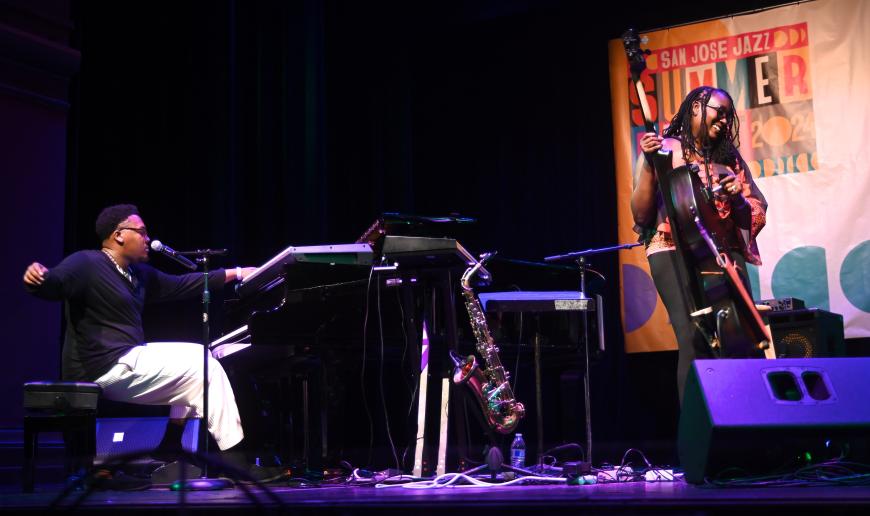
Within minutes of arriving in downtown San Jose early Saturday afternoon, I heard the future of jazz materialize with a potent burst of Gen Z creativity.
San Jose Jazz’s Summer Fest 2024, which ran Aug. 9–11, brought an often overwhelming array of funk, soul, blues, jazz, and kindred Latin musical idioms to stages on and around the Plaza de Cesar Chavez, turning the heart of California’s third-largest city into a roiling musical cauldron.
The festival has long been distinguished by a particularly vibrant roster of Latin musical acts, and this year was no different. Kicking off Saturday’s program in the California Theatre, Mexican vocalist Lucía Gutiérrez Rebolloso played a sensational duo set with Venezuelan piano great Edward Simon (who is the longest-serving member of the SFJAZZ Collective).
Though she took top honors at the Sarah Vaughan International Jazz Vocal Competition in 2022, Rebolloso said this was her first festival gig playing her own music. She was more than ready for the moment, scatting with slippery agility on a romping up-tempo version of “Day by Day.” She was even more impressive on an earlier standard, “(I’m) Confessin’ (That I Love You),” which she introduced with a charming story about her unrequited crush on an older musician and a pitch-perfect original verse revealing her deep feel for the 1930 vernacular.
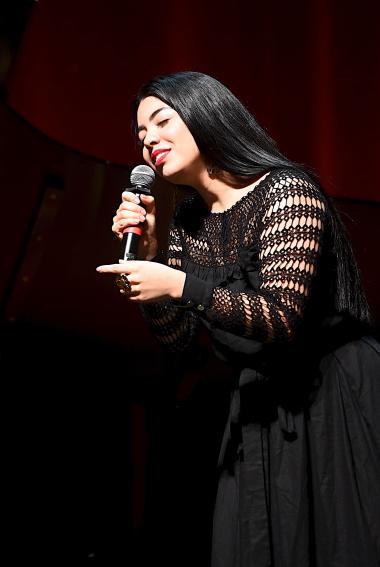
With a voice as lush and sumptuous as any singer on the scene, Rebolloso moves easily down to contralto territory, which is where she took a sensuous version of “Piel Canela,” a tune she learned from one of Eydie Gormé’s classic Spanish-language albums with Trio Los Panchos. I hated to leave, but another highly touted 20-something’s set had already started.
Hustling over to the Montgomery Theater, I caught pianist Jahari Stampley offering another wave of youthful brilliance. Winner of the 2023 Herbie Hancock Institute of Jazz International Piano Competition, the 25-year-old Chicago native played a blazing set with his trio: his mother, revered music educator D-Erania Stampley, moving seamlessly between electric upright bass and alto sax (and a little synth) and Miguel Russell on drums. While Stampley’s tunes weren’t particularly distinctive, he possesses commanding technique and plays with ferocious energy and control. It’s hard to resist a bandleader who follows up a ripsnorting alto solo by shouting, “That’s my mom!”
The festival’s most unanticipated delight was a set by Alejandro Brittes, a Brazil-based Argentine accordionist who specializes in chamamé, a style that emerged from the 18th-century confluence of Indigenous Guaraní and Baroque music in Paraguay, Uruguay, and northeastern Argentina. Nestled in a San Jose Museum of Art gallery filled with photographs, Brittes played a consistently fascinating duo concert with Bay Area percussionist Brian Rice (on cajón and pandeiro) that centered on chamamé standards like “Merceditas” and “Kilómetro 11.” With fluid translation provided by music journalist and DJ Betto Arcos (Summer Fest’s Latin music curator), Brittes introduced each piece with just the right amount of information and commentary. (He plays a trio set with seven-stringed Brazilian guitarist André Ely and bassist Carlos de Césaro on Aug. 16 at Red Poppy Art House.)
On the Jay Paul Company Main Stage, Angélique Kidjo was in top form with a tight band driven by the percussion tandem of Josh Keitt and Magatte Sow. Her set centered on her tribute to Cuban salsa legend Celia Cruz, whose 1974 Fania All-Stars performance in Benin changed the course of Kidjo’s life. She celebrated Cruz on her Grammy-winning 2019 album Celia, a standout gem in a brilliant discography. In embracing the crisscrossing skein of influences set in motion by the transatlantic slave trade, Kidjo seemed to embody Summer Fest’s presiding perspective.
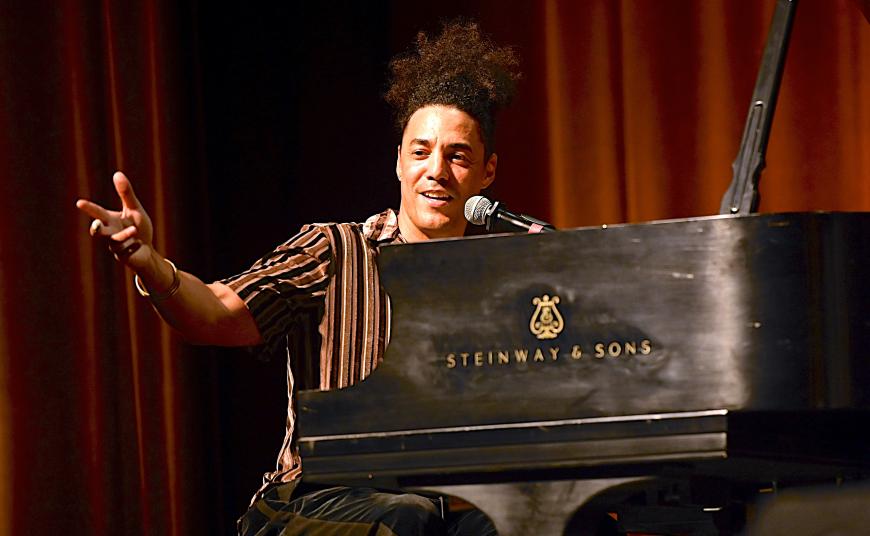
For sheer exuberant joy, the weekend’s highlight came courtesy of Cuban pianist and vocalist Jorge Luis Pacheco at the California Theatre. Keeping track of rising Cuban keyboard talent could be a full-time job, but Pacheco stands out even amid his most impressive peers. Leading a trio with Chilean electric bassist Gerson Lazo-Quiroga and Cuban drummer Reinier Mendoza Valdés, Pacheco merrily perambulated through the Cuban songbook, ringing every last drop of tenderness out of the late Pablo Milanés’s “Yolanda.” The pianist’s lithe, reharmonized arrangement of “Guantanamera” flowed into Bola de Nieve’s standard “El Manisero,” with Lazo-Quiroga often moving into the foreground to play melodic lead. The set finished with Pacheco’s original tribute to Cuban carnivals, “La Conga,” a multipart journey that concluded with him leading the audience in call-and-response vocals.
Doing double duty, the California Theatre also housed the California Music Lounge, a hallway space transformed into one of Summer Fest’s best utilized stages. Coming out of Pacheco’s piano party, Natalie Cressman and Ian Faquini’s set was like a cool breeze at tropical noon. Cressman, an ethereal vocalist and supremely lyrical trombonist, and Faquini, a brilliant Brazilian guitarist, composer, and effective singer, have honed a singular duo, and they were in excellent form. With originals that rival the most sophisticated Brazilian songwriting and gems from the American and Brazilian songbooks, Cressman and Faquini have a repertoire brimming with exquisite material, like a frevo by Brazilian guitarist-composer Guinga that featured intricate vocals coupled with a startlingly burnished trombone passage.
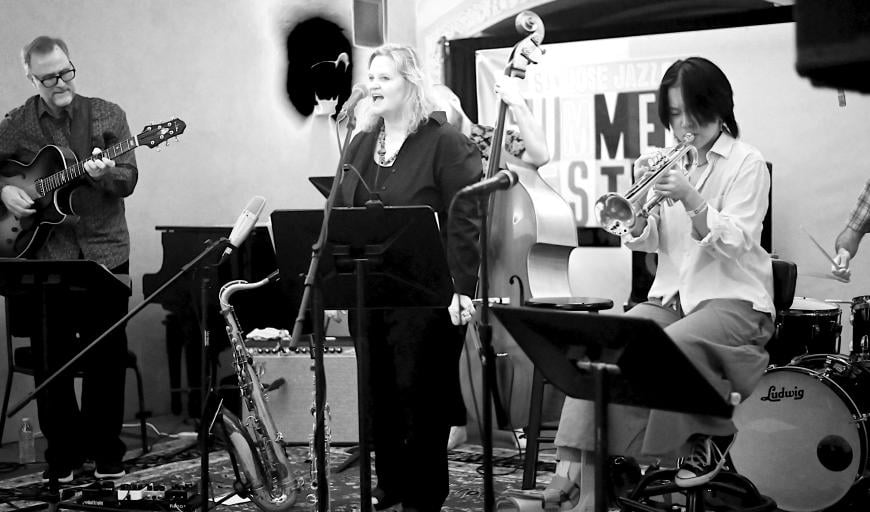
I ended the night in the lounge with a set by San Jose saxophonist Kristen Strom’s multigeneration combo: rising bassist Makailo Kasha, veteran drummer Jim Kassis, and guitarist Scott Sorkin, Strom’s husband and creative partner. Geri Allen’s “Unconditional Love” served as an ideal vehicle for Strom’s lush tone on tenor, while her arrangement of Paul McCartney’s “Blackbird,” a duet featuring her soprano sax with Sorkin’s fluid guitar work, provided one of the festival’s most exquisite moments. Joined by teenage trumpeter Skylar Tang, who plays with the taste and poise of a well-traveled pro, the quintet delivered Wayne Shorter’s “United” with requisite swagger.
Built on Sorkin’s neat, rounded tone, the group’s spacious feel worked effectively on originals, like Strom’s spiraling “Sojourn,” and on the funky blues of Joe Zawinul’s “Scotch and Water.” Sorkin’s arrangement of George and Ira Gershwin’s “It Ain’t Necessarily So” was similarly winning, biting into the sardonic melody. The compressed lyricism of Tang’s solo — I had to check twice she wasn’t using a mute — was beyond impressive. Strom ended the show with Abbey Lincoln’s “The Music Is the Magic,” singing the incantatory lyric and summing up a day well spent.
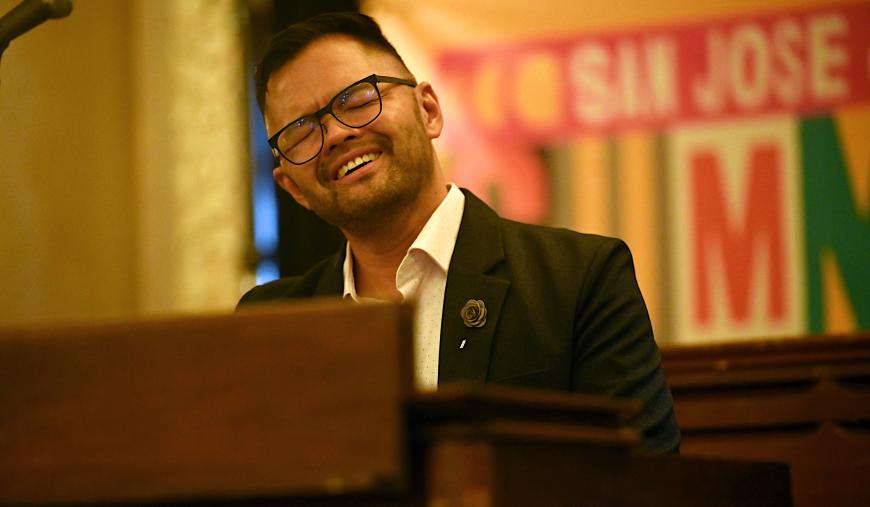
After Saturday’s constant motion, Sunday got off to a relaxed start back at the lounge with San Jose-reared organist Brian Ho. Celebrating the release of his excellent new album Bridges, Ho was joined by drummer Byron “Wookie” Landham, best known for his decades-long tenure with the late Hammond B-3 legend Joey DeFrancesco, and ace guitarist Dan Wilson. Ho has spent a good deal of time playing in churches, and he brings a sanctified touch to the organ combo, whether he’s playing a surging original, like his album-opening “Essence,” or a barn-burning arrangement of the standard “Just in Time.” He was at his most supple digging into Joshua Redman’s bossa “Alone in the Morning” and his most funky on Horace Silver’s “Silver’s Serenade.”
Over on the Main Stage, Lisa Fischer and Grand Baton opened their set with an extended tribute to Luther Vandross, whom Fischer worked with for years as a backup singer. Fischer is a force of nature, but the extreme dynamic range that’s an essential component of her performances is much better suited for a hushed theater than a lively afternoon outdoor venue.
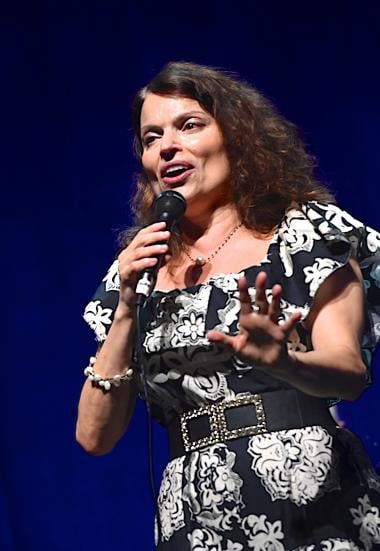
I closed out Sunday at the California Theatre with a near perfect set by Roberta Gambarini’s quartet. The Italian vocalist has been a scarce presence in the Bay Area recently, and she provided an enthralling reminder of her manifold strengths as a performer. Opening with a sublime a cappella rendition of the Oliver! ballad “Where Is Love?” she brought in the band for Rahsaan Roland Kirk’s ode to the enlightened, “Theme for the Eulipions.” Did she know that the club across the street, Mama Kin, was once called Eulipia and later Café Stritch (after the rare horn that was part of Kirk’s multi-instrumental palette) and that Stritch long hosted an annual Rahsaanathon concert series? It wasn’t clear, but Gambarini covered so much ground I wouldn’t be surprised if she did.
An expert scat singer with a clear, winsome tone, she highlighted the yin-yang relationship between Dave Brubeck’s lovely melody “In Your Own Sweet Way” and Iola Brubeck’s gimlet-eyed lyrics. Gambarini’s Antônio Carlos Jobim medley, delivered in Portuguese, effectively combined the oft-overlooked gem “Derradeira Primavera” with the bossa movement-launching “Chega de Saudade.” Whether delivering the French lyric to Astor Piazzolla’s ballad “Oblivion” or navigating her vocalese setting for “On the Sunny Side of the Street” from Dizzy Gillespie’s classic Sonny Side Up album, Gambarini was in complete control.
She couldn’t have been in better hands, with an instrumental trio led by pianist Tamir Hendelman, one of jazz’s most responsive accompanists. (Gambarini and Hendelman are back in the Bay Area on Sept. 13 for a duo gig at Piedmont Piano Company.) They made the most out of their octogenarian Los Angeles rhythm section tandem of bassist Chuck Berghofer, a member of the fabled Wrecking Crew, and drummer Roy McCurdy, a marvel at 87. The sheer overwhelming beauty of Billy Strayhorn’s “Lush Life” made the closing number, Duke Ellington’s “Just Squeeze Me (But Please Don’t Tease Me),” almost an afterthought, a luxury amid a weekend brimming with musical wealth.




